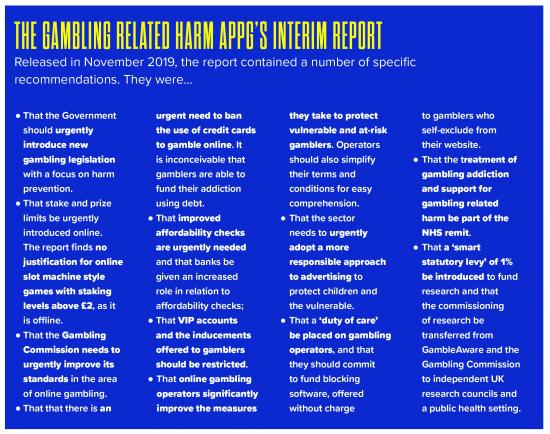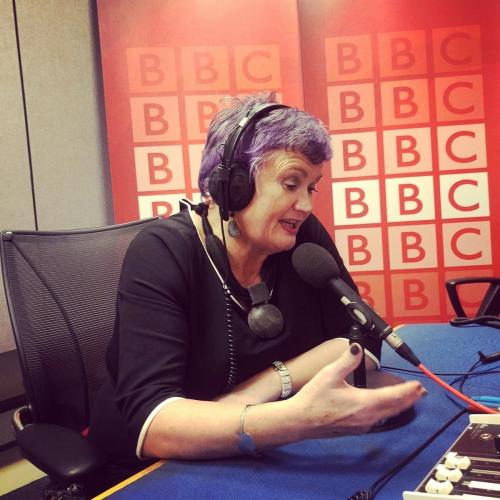Carolyn Harris MP has emerged as one of the industry’s fiercest critics, and a leading advocate of a more responsible, sustainable sector – though her approach and proposed stringent controls for operators make her a controversial figure. She tells Robin Harrison why the sector’s past public affairs failings have handed the initiative to those looking to reshape the industry
Carolyn Harris has been an MP for less than five years and has wasted no time in reshaping the British gambling industry as chair of the Gambling Related Harms All Party Parliamentary Group (APPG).
The APPG, by consolidating support for a reduction in fixed odds betting terminal (FOBT) stakes, played a key role in ensuring the maximum stake was cut to £2. This is expected to lead to thousands of betting shop closures and caused significant write-downs in the value of operator assets.
After the FOBT victory, focus shifted online. An interim report from the APPG, which saw the £2 online stake cap recommended, wiped more than £1bn from the value of industry stocks. A second intervention in February this year, which saw Gambling Commission CEO Neil McArthur all but commit to a review of online stakes within six months, resulted in another decline.
In her own words, she is “a great one fighting for victims.”
“If anyone is being targeted by something that can be prevented, or if anyone is unable to help themselves out of their situation, that’s exactly the sort of cause I look to support,” she says.
Interestingly, she does not see herself as anti-gambling.
“What you’ve got to remember is I come from a working class community where everyone has a bet on the Grand National, does the pools, goes to the bingo, buys raffle and lottery tickets,” she says. “I’m not overly religious, and I don’t come from a place where gambling is not allowed.”
Instead it was an incident one Christmas that showed her the sector’s problems.
Eureka moment
Months after she was elected in 2015, Harris was visited by Matt Zarb-Cousin, then part of the Campaign for Fairer Gambling, to discuss the impact of FOBTs. This piqued her interest and shortly afterwards she was compelled to act.
An individual came to her office, claiming to have lost their wallet, facing a penniless Christmas.
“No toys for the children, no food, nothing,” she says. “I thought this was awful, so we asked a few people to donate – something we now do every year on a larger scale – and we managed to put a hamper together, got toys for his kids, delivered them to his house.”
Then on Christmas Day, she saw this individual playing a slot machine in the pub.
“Didn’t even acknowledge I was there. I spoke to him, he didn’t take his eyes off the machine.
“I asked my husband if he was usually there and he told me that the kid was normally in the bookies, but it was shut for Christmas.”
That was a “eureka moment”, putting what Zarb-Cousin told her into context. She quizzed her husband, which led to more stories of people in their community losing thousands on the machines.
“That was the moment I realised I had to do something. So when I got back to Westminster I phoned Matt and we started from there,” she says. “It was a snowball effect; the more we talked about it, the more people got involved, problem gamblers got in touch, families of problem gamblers followed, it just got bigger and bigger.
“Now we’ve moved online, it’s even bigger.”
The APPG, technically, has no legislative power. But considering the weight its interventions have carried, it’s hard to ignore. It also highlights significant cross-party support for gambling reform.
Harris, a Labour MP, is supported by the Conservative Iain Duncan Smith and Scottish National Party’s Ronnie Cowan, as vice-chairs. Despite differing views, she says the APPG’s leadership forms a united, effective team.
“We have different ways of showing it. IDS tends to be a little bit more forensic, honing in on an issue. Ronnie tends to be a bit more analytical and picks holes in what is said, while I tend to go down the emotional route.”
On raising awareness of the issue of gambling harm, the APPG has been successful. Harris mentions the first urgent question in the current parliament, on the issue of Bet365 streaming FA Cup matches. There was a time that her audience would have been Duncan Smith, Cowan and maybe former Sport Minister Tracey Crouch, in an otherwise empty chamber. Not this time.
“What the APPG has done is raised awareness: one to acknowledge it as an issue, two we have become a crutch for those that are affected by this, three we have become a bit of a stick for those that are inflicting this, and everyone sees us as being the threat to the industry,” she explains.
“People are now saying that we can’t allow an industry that causes this much harm to continue as it is. To my mind we’re one of the most successful APPGs there has been, and I’m very proud to be chairing it.”
On borrowed time
This means the industry, in its current form, is on borrowed time.
“In Westminster, there is a sea change in how members of Parliament, and in the Lords, view the industry,” Harris says. “If [operators] were wise they would make changes themselves before it gets enforced on them.”
Whether or not they are prepared to do this is a different matter. The recommendations put forward in the APPG’s interim report into gambling harms, released in November 2019, contain a number that are reasonable. Some have already been introduced (see box out).
What has attracted all the attention, however, is the call for a £2 online slot stake.
“I don’t see why online slots should be more than land-based,” Harris says of this proposal. “They should be the same. If we legislated for £2 on land, it should be £2 online.”
Some have pointed out a maximum £5 stake would bring online casinos into line with land-based. Whether Harris and the APPG would accept such a compromise remains to be seen.
“I don’t know about that,” she says. “I think [operators] had their opportunity for a barter over fixed-odds betting terminals. They chose to ignore it, thinking we weren’t going to be successful.
“We were successful, and have done the damage. And I think now we can continue to fight for what we think is right, as the voice of reason, with the moral high ground.”
Negotiating position
This kills the notion, suggested by former Labour deputy leader Tom Watson at ICE Vox, that the £2 stake cap was a negotiating stance.
“FOBTs were the opportunity to negotiate,” Harris says.
And FOBTs was the issue that showed the industry in the worst light. It was divided, unwilling to engage and obstructive. Harris puts the blame squarely at the foot of the Association of British Bookmakers (ABB), the body since swallowed by the Betting and Gaming Council.
“They were arrogant,” she says of the ABB. “Whether they thought I was only speaking out against them because I was new or inexperienced, or because it was something to do and I wouldn’t succeed, boy they were wrong.
“They were appalling. They wouldn’t even let gambling companies speak to me. Simple questions that the operators could have easily answered, but they decided not to deal with that.
“The very fact that they thought they could simply not deal with those campaigning for changes to FOBTs just made us all the more determined to ensure the outcome that we felt was appropriate,” she says. “The ball’s in their court now.”
She is keen to stress that the ongoing campaign is not a personal vendetta after the ABB’s response. Instead, such a resounding defeat for the industry gives the APPG the credibility to do more, she says.
She notes that any suggestion of compromise might have gone some way to addressing the issue. Had operators put forward a cap (below the Gambling Commission’s £30 proposal), it would have “taken the sting out of my tail a bit”, she says.
That £30 recommendation is dismissed as something that only suited the industry.
“It didn’t suit the vulnerable,” she says. “I was under the impression that it was [the Commission’s] job to protect players but they are only there to protect the industry.”
This brings us neatly on to the interim report’s other eye-catching conclusion, that the Gambling Commission is not fit for purpose. The APPG has spoken out in favour of an industry ombudsman, arguing that it would be an independent body tasked with dealing with player complaints.
Harris sees the Commission as a regulator for gambling businesses, not for the effects of gambling.
“What do they do for people who are owed money? Nothing,” she says. “They’re not doing their job. I keep waiting for them to prove me wrong, and they keep proving me right,” she says.
She picks out its enforcement activities as a key issue. Harris believes a company that has failed in its duty of care to its customers, or failed to adhere to anti-money laundering violations, should be stripped of its licence. Or at least have it suspended.
“They’re allowed to get away with violations, and until they see there are serious consequences they will continue to chance their arm,” she says.
“Where else do we go? I don’t think we’ve got any option but to take decisive action; the time for negotiation has passed. The only way we’re going to make changes is to put in measures that make it impossible to infringe a set of rules.”
It’s not that the industry is inherently dishonest or unethical, rather overly protectionist. This focus on each company’s own interests, profits and returns to shareholders, means responsibility falls by the wayside.
She says this is exemplified by source of funds checks: “I worry that the industry has a total disregard for the source of gambling funds,” she says. “By that I mean, if someone is earning £2,000 a month, and they’re gambling £16,000, why is that allowed?
“I was told by an industry body that they do affordability checks. If you’re doing that, why are you then not saying to that person, ‘You only earn £2,000, where is the other £14,000 coming from?’
“I’ve seen bank statements and payslips that don’t match up with the deposits coming into that person’s bank account,” she says. “It was evident that these people were stealing money, and yet they still allowed them to gamble.”
In some cases, high spenders are incentivised to gamble by having VIP status. She recalls a meeting with a gambling addict who had lost millions online. This person’s preferred operator had a tiered VIP structure, and the amounts gambled saw him reach the top tier. This led to hospitality at football matches, Wimbledon tickets and other perks, to the point that he was getting a day out a month.
“He earned £400 a week,” Harris says. “How can someone earning £400 a week be at the top rank of a status rung, where he was spending so much that he was getting a freebie a month?”
Moral high ground
Ultimately she sees today’s GB gambling industry as “a house built on sand”. In her view, it is trying to protect profits that it should have never been allowed to generate, as it has been earned without sufficient care and attention to those that suffer harm.
“I talk about the people who are affected,” she says. “I’m not interested in the pounds, shillings or pence, I look at the moral argument.
“I always knew we would win this based on morality. All the way through the FOBT debate I said we wouldn’t win it by talking facts or figures with the Treasury, or by trying to convince the industry it needs to step up.
“It’ll be the consequences, talking about the people who have lost their lives, their minds, or their homes, their husbands, wives or their children – that’s where this argument will be won.”
There are times during this interview where Harris is clearly moved by the cases she has dealt with. As the most visible figure in the APPG, she has become the rallying point for those affected by problem gambling and gambling addiction, a de-facto industry ombudsman.
“If you see my postbag, you wouldn’t believe the level of correspondence that I get,” she says.
“Normal, ordinary people, who have been absolutely laid bare by an industry that shows no compassion and no understanding of the damage they have caused. Until they are prepared to accept its effects, I will keep on going.”
Bear pit
Emotion appears to colour the debate. Industry coverage of the APPG hearings has tended to highlight a particularly febrile atmosphere. One executive – after declining to attend one – described them as “a bear pit”.
Harris laughs when this is put to her.
“I’m interested to know how he can say that, as he’s never been,” she says.
 That particular hearing saw her at her most restrained: “I really wanted the industry to understand that I was willing and happy to talk to them, to try and find a way to help improve their practices.
That particular hearing saw her at her most restrained: “I really wanted the industry to understand that I was willing and happy to talk to them, to try and find a way to help improve their practices.
“I did cry at the end of that, but that was out of frustration,” she adds. “I asked them questions about people who were in the room, and their experiences. And I’m not just talking about stories, I’m talking about emails and bank statements from the industry.
“I’d ask a question about it and they’d claim they didn’t do that – when they were talking about someone sitting less than two feet away. I got so frustrated that I cried.
“I cried because I was sitting there with mothers and fathers of children who had thrown themselves off a building because of how the industry treated them, and enticed them to gamble despite being aware they had a problem. But a bear pit? Do I look like a bear?”
She will concede that the APPG asks “difficult questions”.
“We don’t accept shallow, off the cuff remarks, and I won’t be told that it’s all going to be okay. But come on, it’s a multi-million pound industry and they worry about me? If I worry them, they shouldn’t be in the job.”
Rip it up and start again
And while an APPG has no formal place in the legislature, in the case of the Gambling Related Harm group, it has power and influence. So when Harris talks about pushing for an overhaul of the 2005 Gambling Act, her words carry weight.
“I think it’ll be a new Act,” Harris says. “I’ve got one written – the industry won’t like it, but it’s there and ready to roll – so whenever Boris and Dominic Cummings want to talk, here’s one I made earlier.”
She says it’s largely what’s included in the interim APPG report, alongside “some other stuff that’s maybe a bit stronger”.
“We said some organisations weren’t fit for purpose in the interim report, and in the next we say they’re most definitely not fit for purpose, and I’m not changing my mind on that.”
This is common sense to Harris. While she says that she wants to see changes from the industry, it’s hard to foresee changes of the scale she believes are necessary. Ultimately she sees the social responsibility initiatives taken by the industry as ineffective.
“It’s trying to paper over the cracks, when we really need to hack the wall down and start again,” Harris says.
The whistle-to-whistle ban is dismissed as “not that effective”. The commitment to raise problem gambling funding to 1% of gross gaming yield by 2023? “A knee-jerk reaction”. Voluntary deposit limits? Not as effective as mandatory.
Full accountability is the end goal: “There’s got to be a way of making the industry responsible for the damage it causes, whether that’s NHS clinics or funding organisations that treat problem gamblers, but it has to be financially and morally responsible.”
The industry should have seen this coming. It had a long run of making a lot of money, yet it was only from 2018 that there was evidence of a change in approach, with greater social responsibility safeguards put in place and publicly discussed.
As ever, this comes back to FOBTs: “If they’d thought about this in 2015, when they had an opportunity to get their act together, we’d probably be in a better place now,” she says. “We’d have a better environment. The ABB disregarded me, and they’ve created a monster.
“Not me personally,” Harris adds, laughing.
Carolyn Harris should not be underestimated. She is a successful campaigner and does not shift focus after pinpointing an injustice. The industry has already disregarded her once. Do it again and the consequences could be severe.












